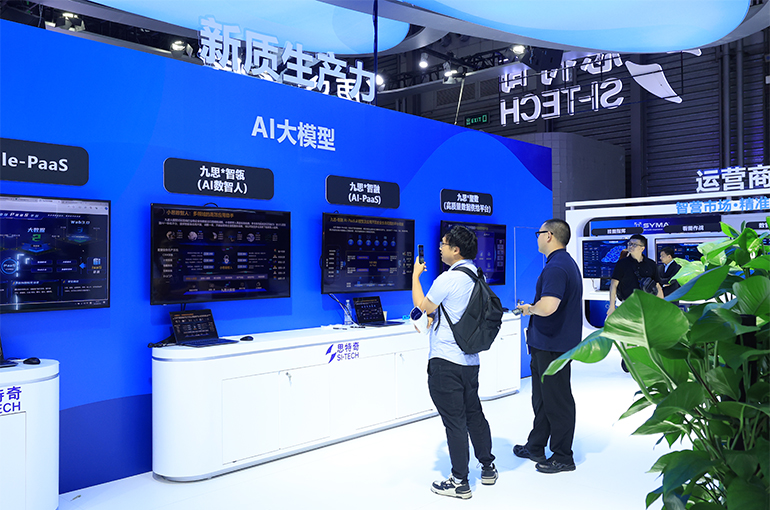 5G-A Era Arrives With Telecos Unveiling AI Strategies
5G-A Era Arrives With Telecos Unveiling AI Strategies(Yicai) June 28 -- The wireless telecommunications industry has entered the fifth-generation-advanced era, with operators' artificial intelligence development strategies becoming clearer at the ongoing Mobile World Congress Shanghai.
5G-A technology is maturing, Yicai learned at the three-day MWC Shanghai, which attracted over 8,000 companies from 115 countries and regions and ends today. More than 30 global operators have completed 5G-A technology verification and around 10 have announced commercial plans for 5G-A, while several models from about 20 phone brands support the feature's default activation.
China Mobile will phase in the construction of 5G-A networks, planning to deploy commercial 5G-A services in 300 cities by the end of this year, Deputy General Manager Li Huidi told Yicai. It aims to achieve large-scale 5G-A services by next year and full commercialization by 2026, he added.
"The application of 5G-A technology can bring new business opportunities and broaden the commercial boundaries," Wang Tao, executive director of Huawei Technologies and director of the Information and Communications Technology infrastructure business management committee, said during a keynote speech at the MWC Shanghai.
Amid the slower 5G network traffic growth, using 5G-A with artificial intelligence technologies is expected to drive traffic back to rapid growth, Wang noted. In addition, the application of 5G-A technology will also assist users in continuously expanding their business boundaries, bringing many new service opportunities, he added.
The high-precision sensing capabilities of 5G-A and base stations' inherent intelligent computing power facilitate route planning for drone security inspections and deliveries and offer round-the-clock trajectory monitoring and assisted navigation, technical personnel of telecoms equipment supplier ZTE said to Yicai.
It can also support the on-demand creation of electronic no-fly zones, ensuring the identification and locking of unauthorized drones within a maximum of three seconds, ZTE's personnel pointed out.
Application Path of AI Technologies Is Clearing Up
At the MWC Shanghai, China's three biggest telecom operators -- China Mobile, China Unicom, and China Telecom -- which have computing power and data resources, voiced their strategies for using AI technology.
AI can autonomously complete various tasks and is gradually becoming the new gateway to information services, said Yang Jie, chairman of China Mobile. The firm will collaborate with industry partners to promote the development of various intelligent technologies, driving the growth of new business forms, including humanoid robots and brain-computer interfaces, he added.
The growth of traditional value-added services for operators, including voice, data traffic, and short message service, has encountered significant bottlenecks, Cheng Zhong, managing partner at Deloitte, told Yicai. The integration of 5G and AI technology has significantly transformed the toB and toC use scenarios for operators, providing them with more monetization opportunities, he noted.
"After deploying AI technology, the demand for data traffic from related applications will increase," according to Cheng. “From this perspective, introducing AI, whether for toB or toC applications, will bring substantial market benefits to operators.”
Equipment manufacturers, including Huawei and ZTE, have successively launched proprietary communication AI models.
AI models can enhance communication networks' automation and intelligence levels, giving hope of evolving from humans assisting machines to machines assisting humans and even to autonomous co-evolution between machines, said Zheng Peng, vice president of ZTE.
Editors: Tang Shihua, Martin Kadiev